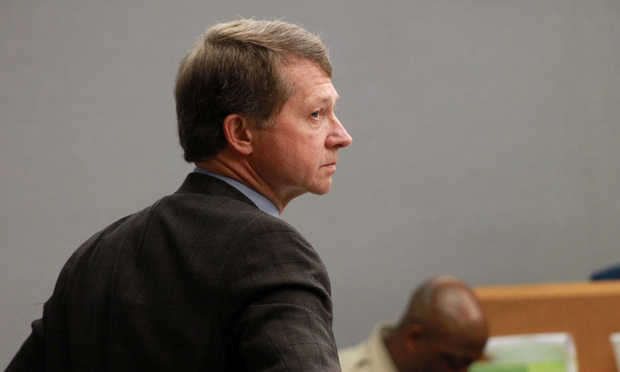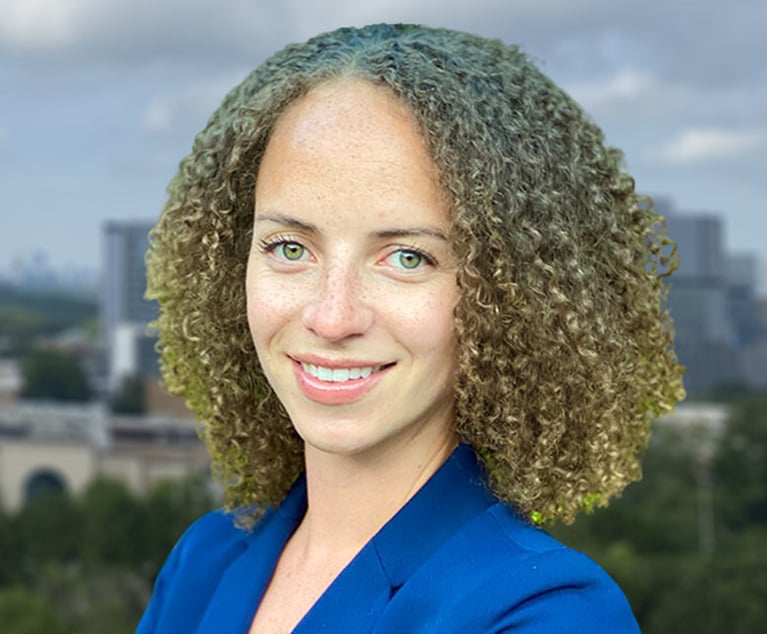The Many Trials of Ford's Lead Counsel Alan Thomas
D. Alan Thomas of Huie Fernambucq & Stewart in Birmingham has defended Ford for much of his three-decade career in trials around the country. He's also been thrown out of a Georgia courtroom—and has fought his way back.
April 02, 2018 at 01:44 PM
7 minute read

Ford Motor Co.'s lead counsel in a high-stakes product liability trial going on in Lawrenceville has traveled a long road to get there.
D. Alan Thomas of Huie, Fernambucq & Stewart in Birmingham, Alabama, has represented Ford for much of his three-decade career in trials around the country—particularly in the Southeast, where he's been seen driving to court in a Ford pickup truck.
But Thomas ran into trouble with a Georgia judge back in 2011 and was tossed out of another Ford trial in Marietta—he and his co-counsel, Paul Malek, too. Cobb County State Court Judge Kathryn Tanksley revoked their permission to practice in the state for the trial and sent them out of the courtroom.
The dust-up was over a disclosure about Ford's insurance coverage that led to a mistrial. During discovery and pretrial motion hearings, the plaintiffs counsel—Jeff Harris, Darren Penn, Steve Lowry, Tony DelCampo and Jed Manton of the firm then called Harris Penn Lowry DelCampo—asked repeatedly for Ford to name any insurance carriers that could be relevant to the case. Georgia law requires all parties with financial or personal interest in a potential judgment to be listed in the pretrial order so that jurors can be screened for any conflicts of interest.
Thomas had responded repeatedly with Ford's standard answer, implying the company was self-insured: “Ford has sufficient resources to satisfy any judgment that reasonably could be expected.”
But on the morning after the first full day of jury selection, Thomas announced in court that he had just learned by email from the general counsel's office that Ford had insurance coverage for verdicts in excess of $25 million. At least six policies for excess coverage could be in play. More were identified later.
Thomas said he had not intentionally misled the court, but the judge called that assertion “almost insulting.” She declared a mistrial, scrapped the jury and ordered a new one, dismissed Thomas and Malek and sanctioned Ford by precluding its defense on one issue: failure to warn of a product defect. In a daylong hearing over the sanction for Ford, an in-house lawyer testified by video that she had at first misunderstood the question from the lawyers about the insurance coverage, then corrected the misinformation just before the drama in court.
As he left Tanksley's courtroom, Thomas was asked if he'd like to comment on what just happened. “I'd love to, but I don't think it would be appropriate,” he answered and kept walking.
He hired a team of prominent Georgia lawyers to straighten things out: former Georgia Attorney General Mike Bowers of Balch & Bingham; Chris Anulewicz of Balch & Bingham; J. Matthew Maguire Jr. of Parks Chesin & Walbert, formerly of Balch & Bingham; R. Page Powell Jr., Michael Boorman and Audrey Berland of Huff, Powell & Bailey; and Richard Brown and Gene Major of Fain, Major & Brennan.
Thomas challenged Tanksley's order disqualifying him. His lawyers told the Georgia Court of Appeals that the episode jeopardized his career and threatened his livelihood. They said he had done nothing to mislead the court and reported the misunderstanding immediately.
It took two years, but Thomas finally won his point. In 2012, the Court of Appeals vacated Tanksley's order revoking Thomas' and Malek's admission to practice as trial counsel pro hac vice in the case of the family of Deebs Young v. Ford—which was long over because Ford settled it in the middle of the trial after losing Thomas. The Youngs had presented most of their witnesses testifying that their 15-year-old son was killed by the seat belt he was wearing when his soccer coach's Explorer rolled over. The grieving parents were to be next on the stand when Ford made the deal.
The disqualification wasn't about that one case, it was about honor, Thomas' lead defender, Bowers, said at the time.
“We thus conclude that because this order bears directly upon the attorneys' interests, they are directly aggrieved by the decision,” Judge Christopher McFadden wrote for the Court of Appeals. Joined by Judges Anne Barnes and William “Billy” Ray, McFadden didn't address whether Tanksley was right or wrong but ruled that she should have allowed the lawyers a hearing to defend themselves before deciding. They remanded the matter to Tanksley, who eventually determined no hearing was necessary since the Young case was over, and the whole dispute dropped. Tanksley has since retired.
Still, the insurance revelation in the Young case led to verdicts being overturned in three other cases that Ford had won—and that stuck. The Georgia Supreme Court unanimously upheld the reversal of one of the cases in 2014. They all settled without going back for new trials.
“If this case is to teach any lesson, it is that the civil discovery process is supposed to work to allow the parties to obtain the information they need to prove and defend their cases at trial before impartial juries,” Justice David Nahmias wrote in a 58-page opinion. “Discovery is not supposed to be a game in which the parties maneuver to hide the truth and relevant facts, and when a party does intentionally mislead its adversary, it bears the risk that the truth will later be revealed and that the judgment it obtained will be re-opened to allow a new trial based on the truth.”
Now, four years later, Thomas is back in Georgia—with his same co-counsel, Malek—trying a case for Ford. This one is before Gwinnett County State Court Judge Shawn Bratton. It's another wrongful death rollover lawsuit—this one about a roof and the death of Melvin and Voncile Hill, South Georgia farmers who died in 2014 on their way to pick up a tractor part.
Thomas declined to comment for this story. “While I would love to talk with you, I'm sure you understand that it would be inappropriate for any of the lawyers to comment on this ongoing case,” Thomas said by email Sunday night.
Like the Young case, the Hill story is tragic and painful. And Thomas is defending Ford just as tenaciously as before, and fighting as much as ever with opposing counsel—this time led by Jim Butler of Butler Wooten & Peak.
Courtroom View Network is capturing the trial on camera, offering subscribers live stream and video. Thomas can be seen taking the same almost friendly tone to start with cross-examining plaintiffs' experts: “We've seen each other before, haven't we?”
From there he moves on to a series of questions to paint the expert as a professional plaintiff's witness against automakers.
The approach brings repeated objections from Butler. And the battle continues.
It's clear that one thing has changed: Thomas is taking no chances with being accused of failing to disclose Ford's insurance coverage. The pretrial order in Hill lists 18 different insurance carriers in two different places, even though Ford still objects to having to qualify the jury on that basis, saying it's unfair and misleading. Ford would call on them for reimbursement only for judgments in excess of $25 million.
And the Hill pretrial disclosures go far beyond those of the past.
“After Ford satisfies any settlement or judgment, it may seek reimbursement from its insurers if appropriate. Insurance coverage varies by year and the circumstances surrounding a case; therefore, Ford must determine which insurance policies cover an occurrence on a case-by-case basis,” Thomas' portion of the order says. “The identity of insurers applicable to this case may change with the passage of time and/or the allegations asserted in the case. For example, excess policies may be sold to different insurers or claims may be made against a policy that will exhaust its limits. The above list of excess insurers is correct as of March 9, 2018.”
The Gwinnett trial (Hill v. Ford, No. 16 C 04179-2) started with jury selection March 19 and is expected to last three weeks.
This content has been archived. It is available through our partners, LexisNexis® and Bloomberg Law.
To view this content, please continue to their sites.
Not a Lexis Subscriber?
Subscribe Now
Not a Bloomberg Law Subscriber?
Subscribe Now
NOT FOR REPRINT
© 2025 ALM Global, LLC, All Rights Reserved. Request academic re-use from www.copyright.com. All other uses, submit a request to [email protected]. For more information visit Asset & Logo Licensing.
You Might Like
View All
Georgia July Bar Exam Results: Highest Overall Passing Rate in 10 Years

University of Georgia's School of Law Announces Programs to Fund More Attorneys in 'Legal Deserts'

Trending Stories
- 1Avantia Publicly Announces Agentic AI Platform Ava
- 2Shifting Sands: May a Court Properly Order the Sale of the Marital Residence During a Divorce’s Pendency?
- 3Joint Custody Awards in New York – The Current Rule
- 4Paul Hastings, Recruiting From Davis Polk, Adds Capital Markets Attorney
- 5Chancery: Common Stock Worthless in 'Jacobson v. Akademos' and Transaction Was Entirely Fair
Who Got The Work
J. Brugh Lower of Gibbons has entered an appearance for industrial equipment supplier Devco Corporation in a pending trademark infringement lawsuit. The suit, accusing the defendant of selling knock-off Graco products, was filed Dec. 18 in New Jersey District Court by Rivkin Radler on behalf of Graco Inc. and Graco Minnesota. The case, assigned to U.S. District Judge Zahid N. Quraishi, is 3:24-cv-11294, Graco Inc. et al v. Devco Corporation.
Who Got The Work
Rebecca Maller-Stein and Kent A. Yalowitz of Arnold & Porter Kaye Scholer have entered their appearances for Hanaco Venture Capital and its executives, Lior Prosor and David Frankel, in a pending securities lawsuit. The action, filed on Dec. 24 in New York Southern District Court by Zell, Aron & Co. on behalf of Goldeneye Advisors, accuses the defendants of negligently and fraudulently managing the plaintiff's $1 million investment. The case, assigned to U.S. District Judge Vernon S. Broderick, is 1:24-cv-09918, Goldeneye Advisors, LLC v. Hanaco Venture Capital, Ltd. et al.
Who Got The Work
Attorneys from A&O Shearman has stepped in as defense counsel for Toronto-Dominion Bank and other defendants in a pending securities class action. The suit, filed Dec. 11 in New York Southern District Court by Bleichmar Fonti & Auld, accuses the defendants of concealing the bank's 'pervasive' deficiencies in regards to its compliance with the Bank Secrecy Act and the quality of its anti-money laundering controls. The case, assigned to U.S. District Judge Arun Subramanian, is 1:24-cv-09445, Gonzalez v. The Toronto-Dominion Bank et al.
Who Got The Work
Crown Castle International, a Pennsylvania company providing shared communications infrastructure, has turned to Luke D. Wolf of Gordon Rees Scully Mansukhani to fend off a pending breach-of-contract lawsuit. The court action, filed Nov. 25 in Michigan Eastern District Court by Hooper Hathaway PC on behalf of The Town Residences LLC, accuses Crown Castle of failing to transfer approximately $30,000 in utility payments from T-Mobile in breach of a roof-top lease and assignment agreement. The case, assigned to U.S. District Judge Susan K. Declercq, is 2:24-cv-13131, The Town Residences LLC v. T-Mobile US, Inc. et al.
Who Got The Work
Wilfred P. Coronato and Daniel M. Schwartz of McCarter & English have stepped in as defense counsel to Electrolux Home Products Inc. in a pending product liability lawsuit. The court action, filed Nov. 26 in New York Eastern District Court by Poulos Lopiccolo PC and Nagel Rice LLP on behalf of David Stern, alleges that the defendant's refrigerators’ drawers and shelving repeatedly break and fall apart within months after purchase. The case, assigned to U.S. District Judge Joan M. Azrack, is 2:24-cv-08204, Stern v. Electrolux Home Products, Inc.
Featured Firms
Law Offices of Gary Martin Hays & Associates, P.C.
(470) 294-1674
Law Offices of Mark E. Salomone
(857) 444-6468
Smith & Hassler
(713) 739-1250







